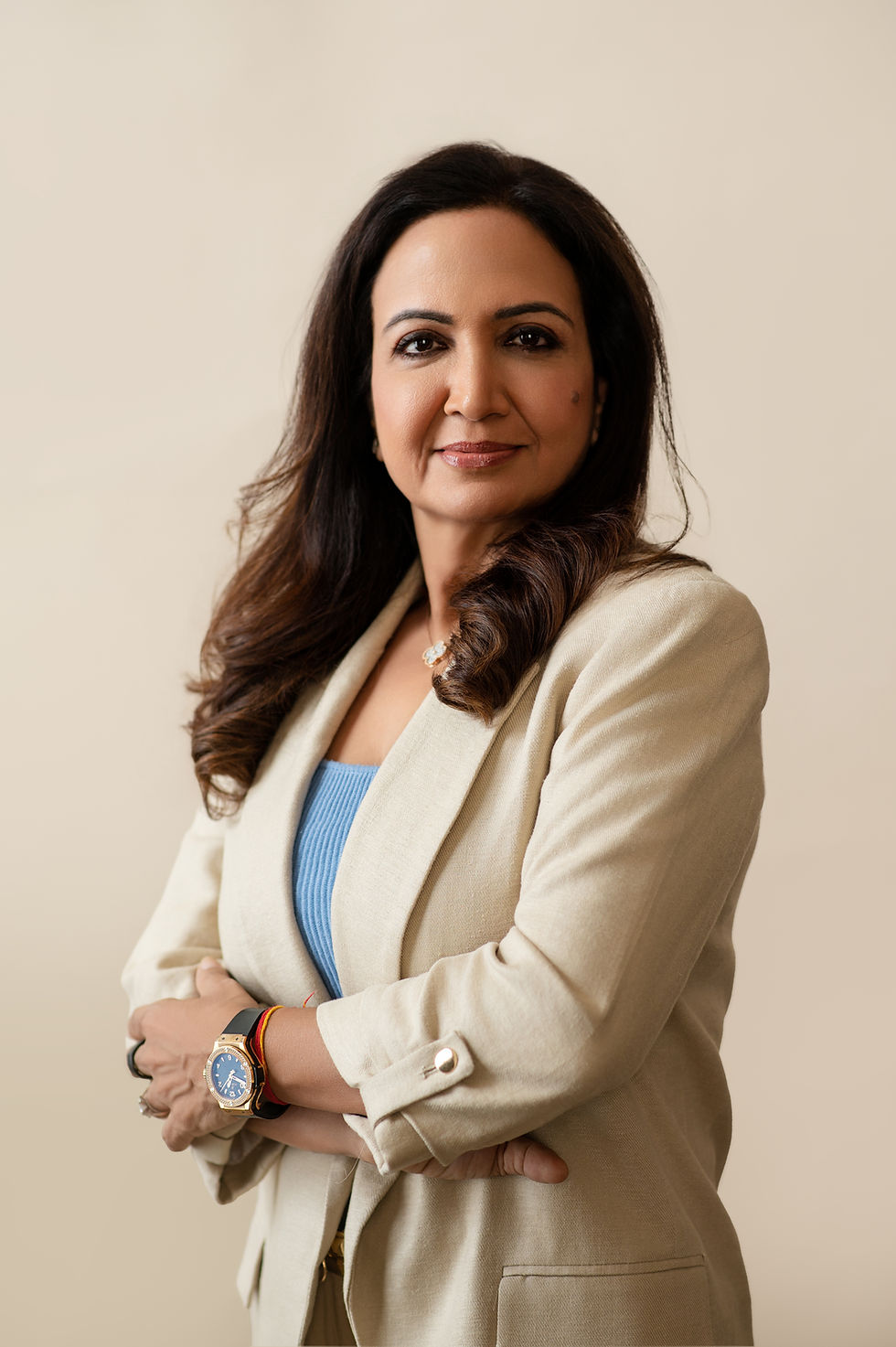Suman Agarwal: Rewriting India’s Nutrition Narrative One Recipe at a Time
- luxpressomagazine

- Jul 29
- 6 min read

From kitchen to clinic, how the SelfCare founder is unjunking India’s plates and mindsets one wholesome bite at a time.
Q1: You have dedicated over 24 years and impacted more than 20,000 lives through SelfCare’s customized health programs what initially sparked your passion for nutrition science and holistic wellness?
Suman Agarwal: I was never naturally fit growing up. In fact, I used to fall ill every few months and noticed early signs of poor health like premature greying. I realized I needed to change something, so I began by re-evaluating my food habits. After all, we are what we eat.
My research led me to explore holistic nutrition, especially since I have a genetic predisposition to conditions like diabetes, high cholesterol, skin disorders, and even cancer. That awareness ignited a deep desire in me to live a long, healthy life, ideally reaching 100 without the burden of chronic illness. This quest for lasting wellness is what drove me to dive deep into the science of nutrition.

Q2: As an Oxford-certified nutritionist and fitness expert, how do you combine scientific precision with culinary creativity in your work?
Suman Agarwal: In my practice, I quickly realized that asking clients to eat just soups, salads, soya rotis, or boiled vegetables wasn’t sustainable. People crave familiar, comforting foods they just need healthier ways to enjoy them. So I took the challenge into my own kitchen. I began experimenting with recipes transforming my favorite junk foods like pizza, pav bhaji, and burgers into healthier versions that didn’t compromise on taste. That journey led to the creation of my cookbook, Unjunked.
My approach is all about making nutritious food enjoyable and accessible. Every recipe in Unjunked is not only delicious but also scientifically balanced calorie-counted and rich in essential nutrients, especially protein. It’s proof that you don’t have to give up taste to eat well.
Q3: SelfCare emphasizes lifestyle correction rather than restrictive dieting. Can you walk us through your philosophy of “going back to basics”—sleep, food, activity—as a sustainable path to health?
Suman Agarwal: For me, good health isn’t just about food—it’s about adopting a holistic lifestyle. Nutrition plays a key role, yes, but without quality sleep and regular movement, even the best diet won’t deliver lasting results.
Sleep is the foundation. When you don’t sleep well, everything else falls apart—it’s the first domino. You feel irritable, lack energy, and are unlikely to exercise or make good food choices. In today’s world, many of us lead sedentary lives, especially in urban settings surrounded by gadgets and screens. We used to naturally get 10,000 to 15,000 steps a day, but now that number has dropped to as low as 2,500 or 3,000. This drastic shift is contributing to muscle loss, obesity, osteoarthritis, back pain, gut issues like constipation, and a range of metabolic diseases.
That’s why exercise is non-negotiable. Even if you’re eating well and sleeping enough, without physical activity, you won’t see the full picture of health. It’s the synergy of these three—sleep, scientifically designed nutrition (with right balance of macro nutrients protein, fat, carb, fibre) and consistent movement—that brings true transformation.
At SelfCare, we don’t believe in quick fixes. Sure, going to a health retreat or detox farm might lead to rapid weight loss, but if you can’t sustain those habits at home, it’s not a real solution. We focus on empowering our clients with long-term, practical tools—like improving step count through simple daily tweaks, or maintaining sleep hygiene in real-life scenarios. These smart, sustainable habits are what create lasting health, not restrictive diets or temporary programs.

Q4: Your cookbooks—The Don’t Diet Diet Cookbook (2009), Unjunked (2012), and Super Kids (2015) each target a different audience. What inspired you to move from general healthy cooking to junk-food alternatives and then to child nutrition?
Suman Agarwal: I’ve always believed that food should be enjoyable, not restrictive. Over the years, I noticed that most Indians are true food lovers we enjoy a wide variety of cuisines. Unlike cultures (like Japanese/Chinese) where people tend to stick to traditional meals, Indians love experimenting with different tastes and textures. That insight led me to create my first two cookbooks—The Don’t Diet Diet Cookbook and Unjunked.
Everyone loves junk food, and if you simply keep saying “no, no, no,” people are going to tune out. So, instead, I wanted to say “yes”—but with the right nutritional tweaks. By adding protein and balancing the macronutrients, we can transform indulgent foods like pizzas and burgers into healthier versions without sacrificing flavor.
My third cookbook, Super Kids, was born out of concern for the younger generation—Gen Z and Gen Alpha—who are growing up in a far more complex and demanding environment than we did. I wanted to address real, modern challenges they face: excessive screen time, phubbing (phone snubbing), long hours on devices, and constant exposure to social media.
There’s also growing dependence on packaged foods, high-fructose corn syrup in baked goods and chocolates, and harmful additives in everyday snacks like microwavable popcorn, instant noodles, and colorful candies. These foods contain anti-nutrients that can have long-term effects on health if consumed regularly.
If we don’t address these issues at the root—starting with what children eat at home—we’re setting them up for future lifestyle diseases. In Super Kids, we offer practical, parent-friendly solutions: tasty, balanced meals that kids actually enjoy, without feeling like they’re eating “diet” food. The goal is to raise a generation that’s not only well-fed but well-nourished.
Q5: Unjunked gives junk-food makeovers like healthy pav bhaji and mithai replacements. How do you balance authenticity and nutrition when reinventing comfort foods?
Suman Agarwal: Balancing authenticity and nutrition has always been second nature to me, especially since I’ve been passionate about cooking from a very young age. That early exposure helped me understand traditional flavors deeply, which is why I'm able to recreate them in a healthier way without losing their essence.
Take Shahi Tukda, for instance. I kept all the traditional elements but gave it a healthy twist—baking the bread instead of frying, and making the rabdi with toned or low-fat milk. I even added almonds for richness, creating a version that’s both indulgent and light.
In my Almond Rabdi, I swapped out the usual rice for fiber-rich fruits. This not only adds texture and natural sweetness but also increases the fiber content without compromising the authentic flavor.
For Dudhi Halwa, I use bottle gourd, which is very gentle on the gut and high in fiber. It gives the body bulk and nutrition, while still maintaining that traditional taste we all love.
Even the Strawberry Sandesh is a dessert which has the goodness of fruit and the power of protein from the chenna.
Even with Vada Pav,authentic Maharashtrian street food. I retained the iconic tadka made with garlic, curry leaves, and mustard seeds to keep the flavor intact. Instead of deep-frying, I bake the bread with vada filling and add paneer to boost the protein content—transforming it from empty calories to a more balanced snack. The difference in taste is minimal—less than 15 to 20%—but the nutritional gain is significant. I started eating unjunked vada pav.. i dont remember the last time I ate a fried vada pav because this was so good.
Similarly, in Pav Bhaji, I sneak in moong dal for protein while keeping the signature spice blend. I also cut down on the butter without affecting the rich, comforting flavor.
So, for me, it’s all about smart substitutions that enhance nutrition while staying true to the soul of the dish.

Q6: Looking ahead—how do you envision SelfCare evolving over the next decade? Will we see more digital tools, new programs (like for aging or mental wellbeing), or expansion beyond Mumbai and Kolkata?
Suman Agarwal: The future of SelfCare is incredibly exciting. We’ve got young, passionate energy driving the team forward. Talented nutritionists like Mona, Vishakha, and Vaishali—who have been with us for over 13 years—continue to bring depth and expertise to our programs. With the support of Dr. Anand and Dr. Juhi with their specialities, we’re taking SelfCare to an entirely new level. I want SelfCare to become synonymous with health, trusted organisation—just like how people say “Xerox” for photocopies. That’s the level of impact I envision.
My daughter Priyanka joined us in 2012 and played a pivotal role in taking SelfCare online and global. She also led the development of our product line, which has helped us reach a wider audience. We’ve already built multiple nutrition verticals tailored to different life stages—children, teenagers, pregnant and lactating women, and the elderly. My hope is to grow our team further and expand into new geographies—we’re looking at Dubai very soon!
Even my youngest daughter, Komal, has contributed by helping us develop the SelfCare app, ensuring we stay ahead in the digital space. Looking ahead, I want to take SelfCare to every corner of India—even the smallest villages—by leveraging AI-powered nutritional guidance. My larger vision is to help India combat and eventually reverse the diabetes epidemic. If we can touch more lives and offer sustainable health solutions, that would be the greatest success of all.




Comments